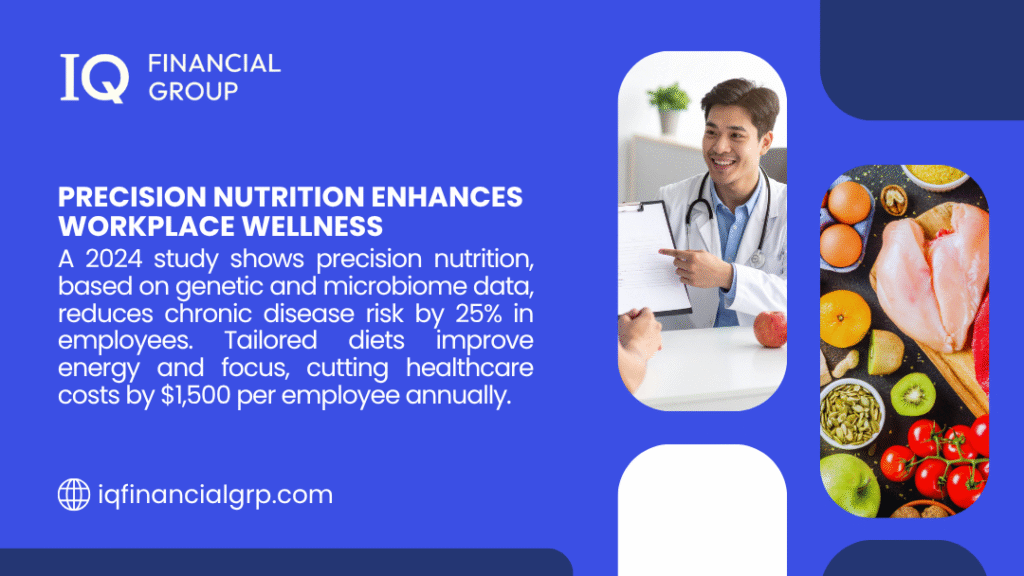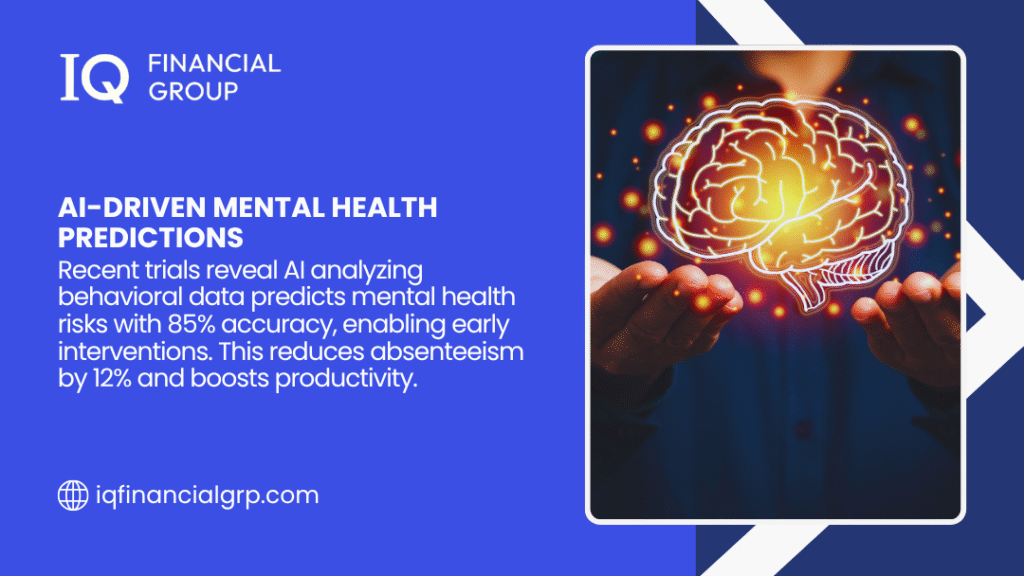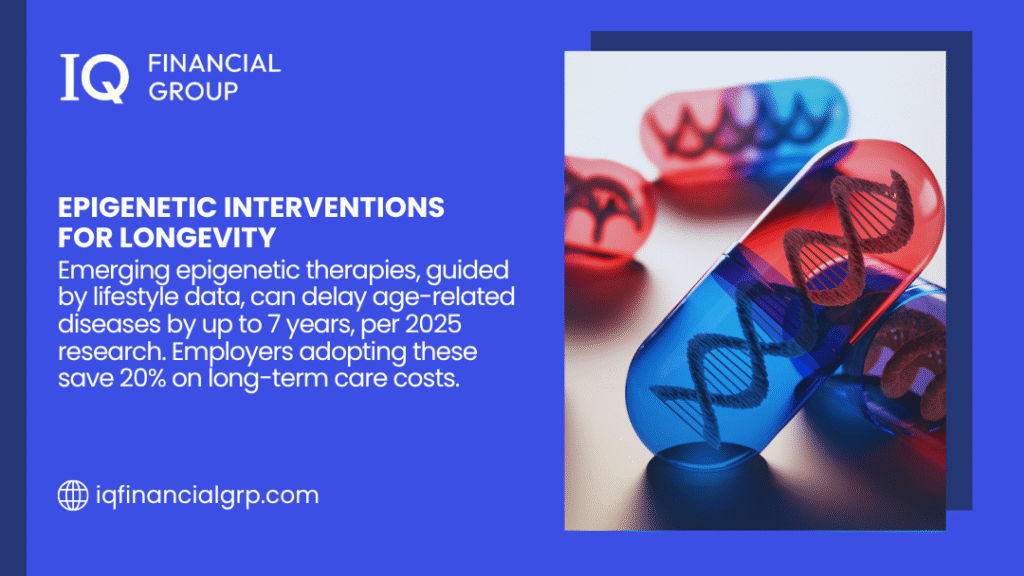The future of personalized medicine for employees represents a fundamental shift from reactive disease management to proactive health optimization. This comprehensive guide explores how cutting-edge technologies, including artificial intelligence, advanced biomarker testing, and regenerative therapies, are being integrated into employee benefit programs.
Unlike traditional group health insurance that treats symptoms after diagnosis, personalized medical care uses Preventative analytics and genetic information to identify the risk of developing chronic conditions years before they manifest.
We examine the clinical evidence, cost implications, and practical implementation strategies for employers seeking to provide personalized healthcare while managing healthcare costs effectively.
Understanding the Shift: From One Size Fits All to Precision Medicine
The healthcare system is experiencing a paradigm transformation. Traditional employee health benefits operate on a reactive model, waiting for diagnosis before treatment begins. The future of personalized medicine inverts this approach entirely, using data collected from advanced diagnostics to predict and prevent disease before it develops.
What distinguishes precision medicine from conventional care? Precision medicine analyzes individual biological markers, genetic information, and lifestyle factors to create personalized treatment plans tailored to each employee’s unique physiology. This contrasts sharply with the one-size-fits-all protocols that characterize most workplace health programs.
Clinical research demonstrates that this Preventative approach delivers superior health outcomes while simultaneously addressing the escalating healthcare cost crisis facing American businesses. Rather than managing disease after diagnosis, personalized treatments target the root causes of chronic conditions before they require expensive interventions.
The Technology Driving Personalized Healthcare
Artificial Intelligence and Machine Learning Algorithms
Artificial intelligence has emerged as the cornerstone of personalized care delivery. Machine learning algorithms analyze millions of health data points in real time, identifying patterns invisible to human observation.
These systems assess an employee’s risk of developing conditions like cardiovascular disease, diabetes, and certain cancers years before conventional diagnostics would detect problems.
AI-powered health platforms continuously monitor data collected from multiple sources, laboratory results, wearable devices, electronic health records, and lifestyle assessments, creating comprehensive risk profiles. When the algorithms identify concerning patterns, they trigger proactive interventions before disease progression occurs.
Advanced Biomarker Testing and Genetic Analysis
The future of personalized medicine relies heavily on sophisticated diagnostic capabilities that extend far beyond standard laboratory panels. Advanced biomarker testing evaluates metabolic, hormonal, and inflammatory markers that reveal biological age versus chronological age, a critical distinction for predicting health trajectories.
Genetic information analysis identifies hereditary predispositions to specific conditions, enabling targeted prevention strategies. This precision health approach allows healthcare professionals to recommend personalized treatment based on individual genetic profiles rather than population averages.
Wearable Devices and Continuous Monitoring
Wearable devices have evolved from simple fitness trackers to sophisticated medical monitoring systems. These technologies provide continuous data streams about heart rate variability, sleep patterns, activity levels, and stress indicators. When integrated with AI analytics platforms, this real-time information enables immediate intervention when concerning patterns emerge.

Clinical Applications in Employee Benefit Programs
Preventative Risk Assessment and Early Intervention
The most significant advantage of personalized medical care in workplace settings is early disease detection. Clinical trials have demonstrated that identifying high-risk employees before symptoms appear dramatically improves outcomes while reducing treatment costs.
Preventative Medicine vs. Traditional Healthcare Approach
| Aspect | Traditional Healthcare | Personalized Medicine |
| Timing | Post-diagnosis treatment | Pre-disease prediction |
| Testing Scope | Standard lab panels | Advanced biomarkers, genetic testing |
| Data Analysis | Individual test review | AI-powered pattern recognition |
| Treatment Strategy | Protocol-based | Biologically customized |
| Cost Focus | Disease management | Prevention investment |
| Outcome Measurement | Symptom reduction | Health optimization |
Regenerative Medicine Integration
Personalized healthcare trends increasingly incorporate regenerative therapies previously unavailable through standard health insurance coverage. These include hormone optimization, targeted supplementation based on nutritional deficiencies identified through precision testing, and immune system strengthening protocols.
Unlike conventional approaches covered by traditional plans, these personalized treatments address biological dysfunction at the cellular level. This represents a fundamental departure from symptom management toward comprehensive health optimization.
Mental Health and Behavioral Analytics
The future of healthcare recognizes that mental and physical health are inseparable. Precision medicine AI platforms now incorporate behavioral health data, identifying employees at risk for conditions like depression, anxiety, and burnout before they require clinical intervention.
This integrated approach provides personalized health information that enables early support through concierge style virtual care, stress management programs, and lifestyle modifications, all coordinated through a unified platform rather than fragmented services.
Cost Implications: The Business Case for Personalized Medicine
Reducing Long-Term Healthcare Costs Through Prevention
The high cost of chronic disease management represents the primary driver of escalating employer healthcare expenses. Clinical research consistently demonstrates that preventing disease costs significantly less than treating advanced conditions.
Consider the economics: Identifying and addressing pre-diabetic markers through personalized nutrition and lifestyle interventions costs a fraction of managing Type 2 diabetes with its associated complications. Similarly, detecting and reversing early cardiovascular risk factors prevents expensive cardiac events and hospitalizations.
Precision medicine analytics enable employers to allocate healthcare resources where they generate maximum impact, preventing expensive conditions before they develop rather than managing them after diagnosis.
Enhanced Productivity and Reduced Absenteeism
Employees receiving personalized healthcare demonstrate measurably better health outcomes, translating directly to workplace productivity. When health problems are addressed proactively rather than reactively, employees experience fewer sick days, reduced presenteeism, and improved cognitive function.
The data collected through continuous monitoring and regular biomarker assessments allows for ongoing optimization rather than crisis management. This proactive approach maintains employee health at peak performance rather than allowing gradual decline until symptoms force intervention.
Financial Mechanisms: Making Personalized Medicine Accessible
Traditional supplemental plans and standard group coverage often exclude the advanced diagnostics and personalized treatments that deliver the greatest preventative value. Progressive employers are implementing innovative financial structures that make precision medicine accessible while potentially reducing net costs.
These programs leverage pre-tax benefit arrangements to provide comprehensive personalized healthcare services, including advanced laboratory testing, concierge style virtual care, and targeted interventions, at no net out-of-pocket expense to employees or employers. By reducing taxable income while adding health benefits, these structures actually increase employee take-home pay while delivering superior healthcare.
Implementation Strategies for Employers
Comprehensive Health Data Integration
Successful personalized medicine programs require seamless integration of multiple data sources. Healthcare professionals need unified access to laboratory results, genetic testing, wearable device data, pharmacy records, and claims information to develop truly personalized treatment plans.
These integration challenges exist within the current healthcare system, where information remains siloed across providers, laboratories, and insurance carriers. Forward-thinking employers are implementing platforms that aggregate this disparate data, enabling the AI-driven analysis necessary for precision health AI applications.
Employee Education and Engagement
The medicine in the future succeeds only when employees actively participate in their health optimization. This requires comprehensive education about the difference between traditional reactive care and proactive personalized healthcare.
Employers should clearly communicate that personalized care isn’t about restricting coverage or shifting costs; it’s about providing access to advanced diagnostics and treatments typically unavailable through conventional insurance.
When employees understand they’re receiving cutting-edge medical services that predict and prevent disease rather than simply treating symptoms, engagement rates increase dramatically.
Privacy Protections and Data Security
Genetic information and detailed health data require robust privacy protections. Employees must trust that their personalized health information remains confidential and cannot impact employment decisions or insurance eligibility.
Successful programs establish clear data governance policies, limit access to aggregated de-identified information for population health management, and ensure individual health details remain protected under HIPAA regulations and beyond.
What’s New in Healthcare: Emerging Technologies and Applications
Pharmacogenomics and Personalized Medication Management
Precision medicine analytics now includes pharmacogenomic testing, analyzing how individual genetic variations affect medication metabolism. This eliminates the trial-and-error approach to prescription drugs, immediately identifying which medications will be most effective for each employee while avoiding those likely to cause adverse reactions.
For employers, this translates to reduced pharmacy costs, fewer adverse drug events requiring medical intervention, and improved treatment efficacy. Rather than cycling through multiple medications hoping to find one that works, healthcare professionals can prescribe the right drug at the right dose from the first prescription.
Microbiome Analysis and Gut Health Optimization
Clinical trials increasingly demonstrate the gut microbiome’s profound impact on overall health, affecting everything from immune function to mental health. Advanced microbiome testing identifies bacterial imbalances contributing to chronic inflammation, metabolic dysfunction, and other conditions.
Personalized treatment based on microbiome analysis includes targeted probiotic supplementation, dietary modifications, and lifestyle interventions that optimize gut health, addressing root causes of diverse conditions rather than merely managing symptoms.
Epigenetic Testing and Lifestyle Medicine
While genetic testing reveals inherited predispositions, epigenetic analysis shows how lifestyle factors activate or suppress gene expression. This empowers employees with actionable information about how diet, exercise, sleep, and stress management directly influence their health at the molecular level.
The future of precision medicine increasingly emphasizes lifestyle interventions guided by epigenetic data, demonstrating to employees that their daily choices significantly impact long-term health outcomes.

Addressing Implementation Challenges
Integration with Existing Benefit Structures
Many employers question how personalized healthcare integrates with their existing group health insurance plans. The most effective approach treats personalized medicine as complementary rather than replacement coverage.
Traditional insurance handles acute care, hospitalizations, and specialist visits, services that require the broad risk pooling insurance provides. Personalized medicine programs focus on prevention, early intervention, and health optimization, services that deliver maximum value when provided proactively rather than through insurance reimbursement after diagnosis.
Complementary Coverage Model
| Service Type | Traditional Insurance | Personalized Medicine Program |
| Acute Care | Emergency services, hospitalizations | Preventative monitoring to prevent emergencies |
| Specialist Care | Diagnostic procedures, surgeries | Early detection reduces specialist need |
| Primary Care | Reactive office visits | Proactive concierge virtual care with AI support |
| Preventative Services | Annual physicals, basic screenings | Advanced biomarkers, genetic testing |
| Chronic Disease | Medication management, monitoring | Root-cause treatment, lifestyle medicine |
| Mental Health | Crisis intervention | Preventative analytics, early support |
Scalability Across Diverse Workforces
Personalized medicine must accommodate employees with varying health literacy levels, technological comfort, and healthcare needs. Successful programs provide multiple engagement pathways, from high-tech app-based platforms for tech-savvy employees to telephone-based support for those preferring traditional communication.
The personalization extends beyond medical protocols to include delivery method preferences, cultural considerations, and individual learning styles. Healthcare professionals trained in patient education ensure every employee can access and benefit from available services regardless of their starting point.
Measuring Return on Investment
Employers rightfully demand evidence that personalized healthcare delivers measurable value. Comprehensive programs include robust analytics tracking:
- Biometric improvements: Changes in key health markers like blood pressure, glucose levels, inflammatory markers, and body composition
- Risk reduction: Decreased prevalence of high-risk employees through early intervention
- Claims impact: Reduction in expensive downstream medical events
- Productivity metrics: Absenteeism rates, disability claims, and employee retention
- Employee satisfaction: Engagement scores and benefit utilization rates
Clinical research demonstrates that comprehensive personalized medicine programs typically achieve positive ROI within 18-36 months, with benefits accelerating over time as prevention efforts mature.
Regulatory Considerations and Compliance
HIPAA and Genetic Information Protection
The Genetic Information Nondiscrimination Act (GINA) prohibits employers from using genetic information in employment decisions or health insurance eligibility determinations. Personalized medicine programs must establish a clear separation between health data used for individual care optimization and any information accessible to employers.
Best practices include third-party administration of all personalized health services, with employers receiving only aggregated, de-identified population health data for benefits planning. Individual health information, including genetic testing results and biomarker data, remains strictly confidential between the employee and healthcare professionals.
ACA Preventive Services and Coverage Requirements
While the Affordable Care Act mandates coverage for specific preventative services, the advanced diagnostics central to personalized medicine often fall outside standard coverage requirements.
This creates an opportunity for employers to differentiate their benefits packages by providing access to cutting-edge screening and prevention services unavailable through conventional insurance.
Employers should work with experienced health insurance brokers who understand both traditional coverage requirements and innovative benefit structures that incorporate personalized medicine components legally and effectively.
The Patient Experience: From Reactive to Proactive Healthcare
Comprehensive Baseline Assessment
Employees entering personalized medicine programs begin with extensive baseline testing far exceeding standard annual physicals. This includes:
- Advanced cardiovascular panels: Beyond basic cholesterol, assessing particle size, inflammatory markers, and endothelial function
- Metabolic analysis: Insulin sensitivity, glucose regulation, and metabolic age assessment
- Hormonal evaluation: Comprehensive hormone panels identifying imbalances affecting energy, mood, and physical function
- Nutritional status: Vitamin, mineral, and amino acid levels guiding supplementation needs
- Inflammatory markers: Identifying chronic inflammation before it manifests as disease
- Genetic susceptibility: Testing for hereditary predispositions informing prevention strategies
This comprehensive assessment provides the data foundation enabling truly personalized treatment plans rather than generic recommendations.
Ongoing Monitoring and Adjustment
Unlike annual check-ups that provide single data points, personalized healthcare involves continuous monitoring and regular reassessment. Wearable devices track daily patterns, periodic biomarker testing measures biological changes, and machine learning algorithms identify emerging concerns before they become problematic.
Healthcare professionals review this accumulated data, adjusting recommendations based on each employee’s response to interventions. This dynamic approach recognizes that health optimization is an ongoing process requiring regular refinement rather than a one-time prescription.
Integrated Care Coordination
Perhaps the most transformative aspect of personalized medicine is comprehensive care coordination. Rather than navigating fragmented services independently, employees access integrated support, including:
- Concierge style virtual care with healthcare professionals reviewing their specific data
- Nutritional counseling based on metabolic testing and genetic factors
- Exercise prescriptions tailored to current fitness levels and health goals
- Mental health support integrated with physical health optimization
- Prescription management optimized through pharmacogenomic analysis
- Specialist referrals when necessary, guided by Preventative analytics
This coordinated approach eliminates the confusion and fragmentation characterizing traditional healthcare, where patients must independently connect disparate services without unified oversight.
Future Developments: What’s Coming Next
Artificial Intelligence Advancement
Current AI applications in personalized medicine represent early iterations of technology that will become increasingly sophisticated. Future machine learning algorithms will integrate even more data sources, environmental exposures, social determinants of health, microbiome changes, and real-time physiological monitoring, creating comprehensive health models predicting risk with unprecedented accuracy.
As these systems analyze data from millions of patients, they’ll identify subtle patterns and intervention strategies invisible to human observation, continuously improving prediction accuracy and treatment efficacy.
Regenerative Medicine Expansion
Clinical trials are advancing regenerative therapies that may eventually reverse aging processes at the cellular level. Stem cell treatments, senolytic compounds that eliminate dysfunctional cells, and peptide therapies that enhance cellular repair mechanisms are transitioning from research settings to clinical applications.
As evidence supporting these interventions accumulates, progressive employers will incorporate regenerative medicine into comprehensive personalized healthcare programs, potentially extending healthy lifespan significantly while reducing age-related disease burden.
Whole Genome Sequencing Accessibility
Currently, most genetic testing examines specific gene variations associated with known conditions. As sequencing costs continue declining, whole genome sequencing will become standard, providing complete genetic blueprints identifying even rare variations affecting health and medication response.
This comprehensive genetic information, combined with an advancing understanding of gene function, will enable increasingly precise personalized treatment recommendations addressing each employee’s unique biological makeup.

Selecting the Right Partner for Implementation
Expertise in Precision Medicine
Not all benefit providers understand the clinical nuances distinguishing effective personalized medicine programs from superficial wellness initiatives. Employers should partner with organizations demonstrating:
- Deep clinical expertise in precision diagnostics and personalized treatment protocols
- Proven technology platforms integrating AI analytics with human clinical oversight
- Established relationships with laboratories providing advanced biomarker testing
- Healthcare professionals trained in functional and regenerative medicine approaches
- Transparent outcome tracking demonstrating measurable health improvements
Financial Structure Expertise
The innovative financial mechanisms making personalized medicine accessible require specialized expertise. Partners should understand Section 125 cafeteria plans, pre-tax benefit optimization, and creative structures that deliver premium services while potentially reducing net costs to both employers and employees.
Working with knowledgeable insurance brokers who specialize in innovative benefit design ensures programs comply with all regulations while maximizing financial efficiency.
Comprehensive Service Integration
Effective personalized medicine requires seamless integration of multiple service components, diagnostic testing, concierge virtual care platforms, care coordination, pharmacy services, and data analytics. Rather than assembling these components independently, employers benefit from partnering with organizations offering fully integrated ecosystems where all services communicate effectively.
Conclusion: The Imperative for Change
The future of personalized medicine for employees isn’t a distant possibility, it’s an emerging reality that forward-thinking employers are implementing now. As healthcare costs continue escalating and chronic disease prevalence increases, the reactive model characterizing traditional benefits becomes increasingly unsustainable.
Personalized healthcare offers a fundamentally different approach, one that uses cutting-edge diagnostics, artificial intelligence, and evidence-based interventions to predict and prevent disease before it develops. This proactive strategy delivers superior health outcomes while addressing cost concerns that threaten the viability of employer-sponsored benefits.
The question facing employers isn’t whether to embrace personalized medicine, but how quickly to implement it. Companies that move decisively gain competitive advantages in recruitment and retention while investing in their workforce’s long-term health and productivity. Those maintaining status quo approaches will face escalating costs and deteriorating employee health outcomes.
For organizations ready to explore how personalized medicine can transform their employee benefits, IQ Financial Group provides expert guidance on implementing cutting-edge programs that deliver measurable results. Our specialists understand both the clinical components of precision medicine and the financial structures that make these innovations accessible.
Contact our team to discover how personalized medicine can reduce your healthcare costs while providing employees with the preventative, Preventative care they deserve.

